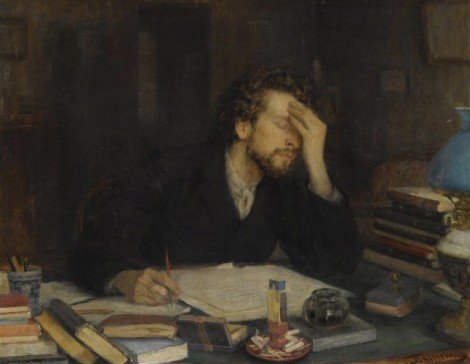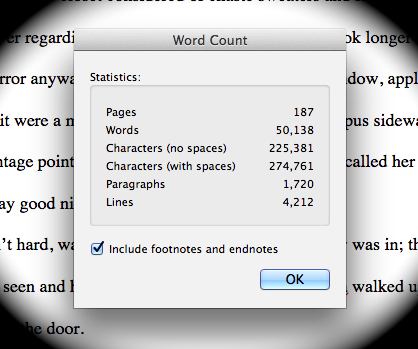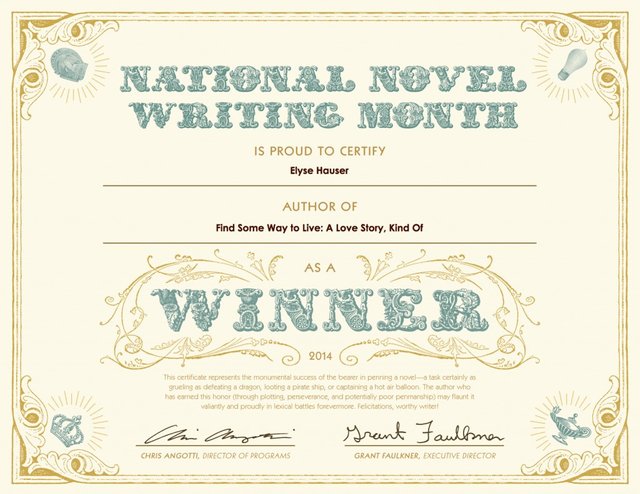National Novel Writing Month: My First Time
NaNoWriMo is fast approaching, so in the spirit of the season I'm reposting my story about the first time I tried writing a novel in one month. You can read the original post at sensiblereason.com. And yes, I am a verified writer! Check out my Twitter @ElyseHauser for proof.

Faulkner's typewriter.
It was around mid-summer when it hit me. An inexorable desire to do something new, something that I’d had on my mind since high school, something that I had never actually tried before. No, it wasn’t a new sex position. It was NaNoWriMo.
National Novel Writing Month, affectionately known as NaNoWriMo, is a yearly challenge in which anyone who’s interested, from the professional writer to the person who usually doesn’t write anything more than a Facebook update, attempts to write a novel in the month of November. The rules are simple: in order to win, you must write at least 50,000 words of original work before November is over. Outlining and extensive planning are permitted prior to November 1st, but actual novel-writing cannot start until November does. Editing during the writing process is discouraged, but procrastination is encouraged—as long as it’s part of your creative process. What you come up with might be brilliant, but it’s just as likely to be absolute madness or fantasies that would never otherwise have made it to paper. It doesn’t matter. Either way, if you meet the 50,000 word count, you win.
In short, it’s unlike any of the academic and professional writing I spend most of my time doing, and for some reason, after knowing about NaNo for eight or nine years and never actually doing it, my desire to participate suddenly became overwhelming. As November approached, I was in my final semester as a full-time grad student, working on my thesis and writing seminar papers in addition to all the freelance publishing I do outside of school. To attempt NaNoWriMo on top of all that was insane, maybe even impossible. Somehow, that only made the project that much more appealing.
I visited the NaNo website around mid-October on the pretense that I was just looking around for fun, but by the time I’d clicked through a few links on the site I was already sold. There were inspirational posts, ways to connect with other writers, approximates of how many words per day I’d have to hit that didn’t sound scary at all. It’s just a novel, after all, I thought. 50,000 words? Hell, that’s more like a novella than a full novel anyway. I could do this. Or maybe I couldn’t, but I wasn’t going to let that stop me from trying.
In the later days of October, I jotted down vague notes of plot points and character names and details. I drew an elaborate chart to map out what each character would be doing at various points in time, but never bothered to fill it in. I had decided on an idea for a novel that I’d been bouncing around in my head for a while, which was mostly based on actual people and events from my past. I figured that would be easier than making up an entire story from scratch. After all, even the strangest fiction reflects reality in some ways, right? It would be just like real life, only better, because I could change the parts I didn’t like. Oh, the power of fiction.
So, with high hopes, I commenced writing on November 1st. I’d told as many people as possible about my NaNoWriMo plans so I’d feel compelled to actually stick to the project, but in retrospect, it probably wasn’t necessary. Once I get an idea in my head, I have a hard time letting it go—especially when it comes to writing projects. So I wrote. I didn’t start out with any particular word counts. I’m bad at following rules and a natural procrastinator, but I figured I’d just write as much as I could, as often as I could, and check my word count every so often to see how I was doing.

By Leonid Pasternak.
I started off strong, but not unexpectedly, by a couple weeks in I was starting to kind of fall off the wagon. I had 2,000 word days, but I also had 200 word days that I never made up for. I began to skip writing days here and there. By the 15th of November, I should have been at 25,000 words, but when I checked at the end of the day I’d barely hit 18,000.
I also struggled with content. Since I’d been writing nonfiction, including both journalism and creative nonfiction, for so long, breaking out of the habit of just writing what actually happened was proving harder than I’d expected. My characters just wanted to have fun all the time and flirt and drink and talk about nothing (I’d loosely based the story on my life as a college undergrad, which explains a lot of that). “Why don’t you go out and, I don’t know, learn some major life lessons?” I gently cajoled them. “How about we go do something, like get a job or move to another country? Maybe get involved in a serious relationship instead of just hanging out with your attractive friends all the time?”
“Nah, we’re good,” they said, as scene after scene continued to meander through the young lives of these early-20-something college kids. My characters were smart, interesting people, and they weren’t exactly directionless, but my god, all they ever wanted to do was hang out and have a good time.
But even though I was behind and struggling, I couldn’t justify quitting with 18,000 words already on paper. In fact, the looming last half of the month strengthened my resolve to catch up and prove the doubts in my head wrong. I sketched out a plan: if I could hit 30,000 words by the 20th, I’d have ten days to do the next 20,000. That would amount to 2,000 words a day, which, as I’d found by this point, would be totally doable if I could stay focused. But first, I had to get from 18,000 to 30,000 words in the next five days.
In my usual disorganized style, I spent the next few days writing until I couldn’t write anymore, without obsessively checking my word count or stressing about all the editing I wasn’t doing. I also started relinquishing control to my characters. Instead of fighting them on the direction of the plot, I let them do whatever they wanted. Stay up all night smoking weed and talking about The Future and Big Life Goals? Sure. Make out in the elevator with a friend? Cool. Walk the railroad tracks to downtown in the middle of the night with three people who are all on acid? Great. I gave my characters free rein, and scene after scene began to flow onto the page. By the 20th, I was right where I needed to be, at 30,000 words.
Once I’d gotten that far, the last ten days were a relative breeze. 2,000 words a day came easily with just a couple of hours of focused writing. Sometimes I wrote first thing in the morning and stayed on top of my to-do list, but just as often I’d start writing when I got home late at night, staying up well past midnight to meet my self-imposed goal for the day. It worked. I didn’t fall behind again, and I found support from even my non-writer friends, who would see me glued to my laptop and ask what the hell I was working on. With one final push during a slow day at work on the 30th, I was done. 50,000 words and nearly 200 pages later, I had met my goal.

My plot had holes, unfinished business, and loose ends that were never tied up. Some characters developed more than others. I never even thought about writing an ending, and I left plenty of middle parts out too. But that didn’t matter. I entered my text into the word count checker on the NaNoWriMo website, uploaded a synopsis and excerpt, and there it was—my novel.
As soon as my word count was verified, a joyous screen popped up on the website that announced “WINNER” in bold, fancy letters. There was a certificate I could put my name on and share, and various other badges for my social media accounts that certified me as a 2014 NaNoWriMo success story. No, I didn’t actually win anything. That’s not the point of NaNoWriMo. I didn’t even actually have a complete, publishable novel yet. But it was oddly satisfying nonetheless. The point of NaNo isn’t to write a perfect novel, or even a good one—it’s just to write. And I did it.

Seeing that big, fancy winner’s certificate with my name on it reminded me of complaints I’ve heard about the “everybody gets a trophy” concept my generation was raised with. People who believe in the ideals of competition and measurable success rail against the idea that you can “win” just by participating. But that’s what NaNoWriMo is about: everybody can win. You don’t have to be good, or even be better than anybody else. All you have to do is participate. It’s not an idea many people like, but it’s one that I grew up with, and one that I personally believe in. I’m well-versed in the competitive side of writing as well: the rejection letters from literary magazines, the struggle to get a book proposal accepted, the cutthroat classes that pit writers against each other. It’s a world that I have to participate in sometimes, but it’s not one that I want to let define my writing. And that’s where NaNoWriMo comes in.
In a writer’s mad struggle for attention and accomplishment, there needs to be a space for fun and creativity, something to remind us of why we pursued this craft in the first place, and something to inspire people who never thought of themselves as writers before to write. NaNoWriMo provides a way to define success that doesn’t involve paychecks or publication credentials, and I’m going to keep that in mind as I turn back to more serious projects. Many times, the fear of failure and the internal perfectionist fight me as I’m trying to put words on the page. So the next time I’m struggling with a bout of self-doubt-induced writer’s block, I’m going to remember the unofficial NaNoWriMo code: If you write, you win.
And if you don’t write, you don’t win—but don’t worry, because there’s always next year.
If you like my writing, you can find more of it at elysehauser.com.
It's best not to copy and paste things, You may get flagged, But because this appears to be yours. I still upvoted! Those are impressive results. I can't wait to see what everyone writes this upcoming month!!! I wish I participated in Inktober more.
Thank you! Yeah, I wish that policy was different - I have a really busy schedule so reposting my content from other platforms allows me to post more often. But anyway yeah NaNoWriMo is fun and Inktober is really cool - I'm not a visual artist but a lot of my friends did it this year!